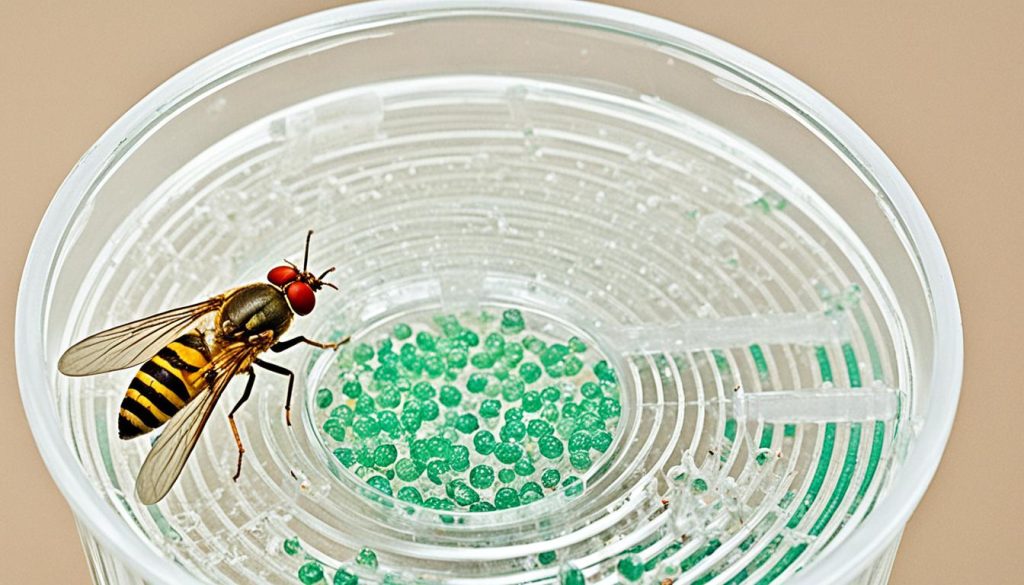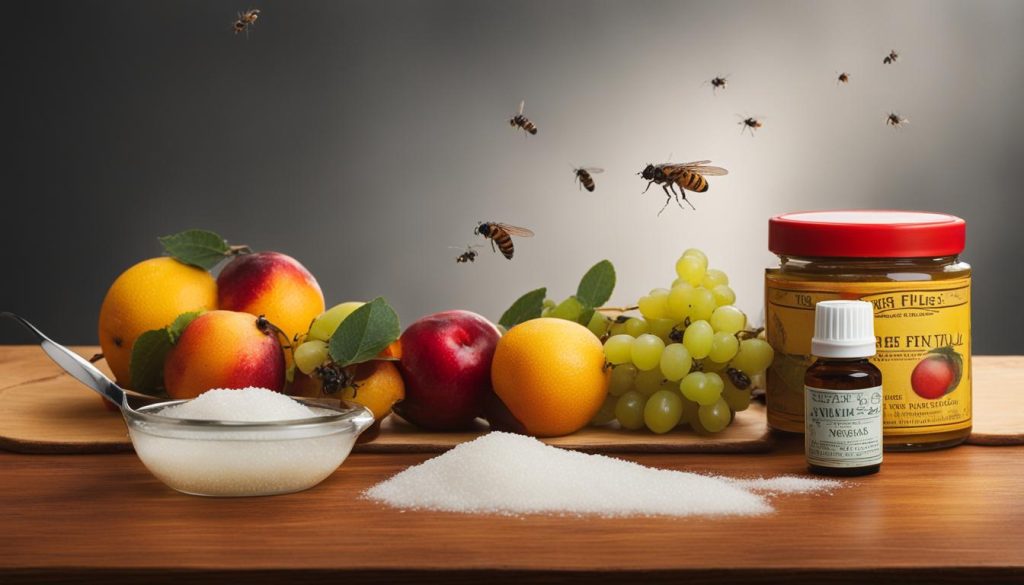Banish Fruit Flies in Drains Effectively!
Did you know that fruit flies can lay up to 500 eggs at a time and complete their life cycle in just 8-10 days? These tiny pests can quickly become a nuisance in your kitchen, particularly in drains where they thrive. But don’t worry, I’ve got you covered with some effective tips to help you get rid of fruit flies in your drain once and for all!
Key Takeaways:
- Eliminate the source of fruit flies by properly storing produce and sealing garbage and compost areas.
- Clean up sticky messes and crumbs promptly to prevent fruit fly infestations.
- Use boiling water, salt, baking soda, vinegar, or drain cleaners to eliminate fruit flies in drains.
- Try homemade traps using cider vinegar, beer, or fruit fly-tempting liquids to catch and eliminate fruit flies.
- Use natural fruit fly repellents like lemongrass, lavender, and cedar wood to deter these pests.
“Keeping Your Kitchen Pest-Free”
To maintain a pest-free kitchen, it’s important to implement some preventive measures. Keeping your kitchen clean and free of food debris and crumbs is essential. Regularly wipe down counters and surfaces to remove any potential attractants for fruit flies. Additionally, remember to take out the garbage frequently and ensure it is tightly sealed to prevent any lingering odors that may attract pests.
Properly storing produce in the fridge is crucial to eliminating fruit flies naturally. Be sure to discard any overripe or rotten fruits and vegetables promptly. These decaying items can serve as breeding grounds for fruit flies. You should also keep compost bins and garbage cans tightly sealed to prevent access for pests. Consider storing these containers in the fridge or freezer during warmer months to further deter fruit flies.
Using natural home remedies for fruit flies can also be an effective strategy. Lemongrass and lavender essential oils are known repellents for fruit flies. You can create a spray by mixing a few drops of these oils with hot water and applying it in problematic areas like the kitchen sink, garbage, compost, and fruit bowls. Another natural repellent is cedar wood. Placing bowls of cedar wood chips in your kitchen can help deter fruit flies from entering the space. Additionally, having a basil plant in your kitchen not only adds flavor to your recipes but also acts as a deterrent for fruit flies.
By following these steps and implementing proper kitchen hygiene practices, you can reduce the likelihood of fruit fly infestations and keep your kitchen pest-free.
Quick Tips for Kitchen Pest Control:
- Keep your kitchen clean and free of food debris.
- Wipe down counters and surfaces regularly.
- Take out the garbage frequently and keep it tightly sealed.
- Store produce properly in the fridge and discard any overripe or rotten fruits and vegetables.
- Seal compost bins tightly and consider refrigerating or freezing them during warmer months.
- Use natural repellents like lemongrass and lavender essential oils or bowls of cedar wood chips.
- Consider having a basil plant in your kitchen to repel fruit flies.
“Effective DIY Traps for Fruit Flies”
If you’re dealing with a fruit fly infestation, there are several DIY traps you can try to effectively get rid of these pesky pests. Here are some simple and effective methods:
1. Cider Vinegar Trap
Create a dish of cider vinegar with a few drops of dish soap. The sweet scent of vinegar will attract the fruit flies, and the dish soap will break the surface tension, causing the flies to drown once they land on the liquid.
2. Beer or Wine Trap
Another option is to use a glass of beer or wine covered with plastic wrap and pierced with tiny holes. The fermented aroma will lure the fruit flies in, but the plastic wrap will prevent them from escaping.
3. Funnel Trap
For a creative trap, place fruit fly-tempting liquid or fruit scraps in a mason jar and cover it with a rolled-up piece of paper to create a funnel. The flies will enter the jar but won’t be able to get out through the narrow funnel opening.
These homemade traps can be placed near potential breeding grounds like compost bins or sink drains, where fruit flies are commonly found. While these traps can help in the short term, it’s important to clean and eliminate fruit flies at the source to prevent further infestations. Remember to maintain good hygiene practices and tackle the root cause of the infestation to effectively control fruit flies in your home.
“Alternative Methods for Fruit Fly Control”
In addition to traps, there are some alternative methods you can try to control fruit flies. Lemongrass and lavender scents are known to repel fruit flies, so you can mix essential oils with hot water and spray them in problematic areas like the kitchen sink, garbage, compost, and fruit bowls. Cedar wood chips can also serve as a natural repellent for fruit flies. Keeping a bowl of cedar wood chips in the kitchen can help reduce fruit fly populations. Another natural repellent is basil, which not only repels fruit flies but also provides a bonus herb for cooking. By incorporating these alternative methods into your fruit fly control routine, you can further prevent infestations and keep your kitchen pest-free.
“Additional Tips for Fruit Fly Prevention”
Preventing fruit fly infestations in your kitchen requires a multi-faceted approach. In addition to the methods mentioned earlier, there are some additional tips you can follow to keep these pesky pests at bay.
Regularly cleaning the drains in your kitchen is crucial in eliminating potential breeding grounds for fruit flies. Use a mixture of salt, baking soda, and vinegar followed by boiling water to flush away any organic matter that may attract them.
It’s also important to regularly flush your garbage disposal with ice cubes to dislodge any stuck-on food particles. By keeping this area clean, you significantly reduce the chances of fruit fly infestations.
Furthermore, make it a habit to wipe down counters and surfaces regularly. Eliminate any food remnants or spills that may serve as an invitation for fruit flies. Store food properly in sealed containers to prevent access and keep your kitchen pest-free. Don’t forget to take out the garbage frequently and ensure it is tightly sealed.
By implementing these preventive measures, you can minimize the chances of fruit fly infestations and maintain a clean and pest-free kitchen environment.
- Investing Wisely: How Windows & Doors in Boost Property Value and Financial Health - April 24, 2025
- The Financial Impact of Personal Injuries: Why Legal Help Matters for Business Owners - April 16, 2025
- The Hidden Financial Costs of Domestic Assault: What Business Owners Need to Know - April 16, 2025














